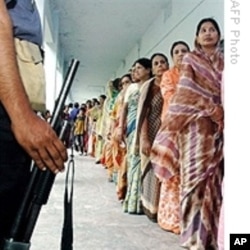Access to education, economic cooperation, food security, global health, climate change, and threat of terrorism, are among the challenges that call for increased cooperation between the United States and Bangladesh, said U.S. Under Secretary of State for Public Diplomacy and Public Affairs Judith McHale.
During her 3 day visit in early February, Under Secretary McHale met with Bangladeshi government and political leaders, academicians, and civil society activists "to see first how the United States and Bangladesh are working together to further mutual understanding, and ultimately, prosperity for the people of our great countries, the region and the world."
Speaking February 7 to faculty and students at Dhaka University, Under Secretary McHale noted, "The late Senator Edward Kennedy planted a banyan tree not far from here, when he came to Bangladesh 38 years ago. He stood behind the people of Bangladesh as you fought for nationhood. Just like that banyan tree, the ties between the U.S. and Bangladesh have continued to grow," she said. "Today, millions of Americans stand behind Bangladesh as you build democratic institutions, develop your economy, and foster peace and security here and in the region."
Under Secretary McHale said the U.S. is working hard to reach out to the Muslim world and build a new relationship. As a moderate, Muslim-majority country with a strong relationship with the U.S., Bangladesh is an important part of that outreach. The U.S. plans to strengthen that bond through programs in food security, climate change, women's empowerment, business and trade development and more. The U.S. hopes that Bangladesh will continue to build productive relationships with the United States and with Bangladesh's neighbors to promote global stability and prosperity.
U.S.-Bangladesh ties are strong. Some of Bangladesh's most distinguished leaders, including Dr. Muhammad Yunus studied in the United States. U.S. funded education cooperation programs have helped Bangladeshi teachers and students improve their English language skills, promoted internet access for Bangladeshi schoolchildren, and enabled Americans to study the language and culture of Bangladesh.
For its part the United States hopes for even closer ties with Bangladesh. Under Secretary McHale said she was greatly encouraged by the current state of relations and sees "exciting possibilities" in the months and years ahead.
During her 3 day visit in early February, Under Secretary McHale met with Bangladeshi government and political leaders, academicians, and civil society activists "to see first how the United States and Bangladesh are working together to further mutual understanding, and ultimately, prosperity for the people of our great countries, the region and the world."
Speaking February 7 to faculty and students at Dhaka University, Under Secretary McHale noted, "The late Senator Edward Kennedy planted a banyan tree not far from here, when he came to Bangladesh 38 years ago. He stood behind the people of Bangladesh as you fought for nationhood. Just like that banyan tree, the ties between the U.S. and Bangladesh have continued to grow," she said. "Today, millions of Americans stand behind Bangladesh as you build democratic institutions, develop your economy, and foster peace and security here and in the region."
Under Secretary McHale said the U.S. is working hard to reach out to the Muslim world and build a new relationship. As a moderate, Muslim-majority country with a strong relationship with the U.S., Bangladesh is an important part of that outreach. The U.S. plans to strengthen that bond through programs in food security, climate change, women's empowerment, business and trade development and more. The U.S. hopes that Bangladesh will continue to build productive relationships with the United States and with Bangladesh's neighbors to promote global stability and prosperity.
U.S.-Bangladesh ties are strong. Some of Bangladesh's most distinguished leaders, including Dr. Muhammad Yunus studied in the United States. U.S. funded education cooperation programs have helped Bangladeshi teachers and students improve their English language skills, promoted internet access for Bangladeshi schoolchildren, and enabled Americans to study the language and culture of Bangladesh.
For its part the United States hopes for even closer ties with Bangladesh. Under Secretary McHale said she was greatly encouraged by the current state of relations and sees "exciting possibilities" in the months and years ahead.





